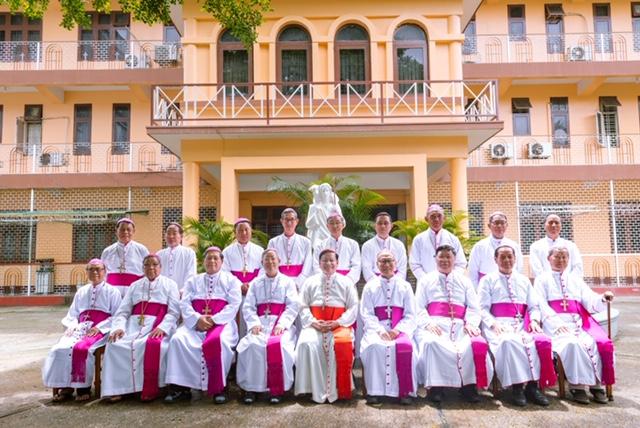Myanmar’s bishops appeal for end to hostilities, call on government, military to respect people’s rights

The Catholic bishops of Myanmar called on all warring factions in the country to put an end to all hostilities, “invest in peace,” and unite against the coronavirus pandemic.
“Amidst the [coronavirus] pandemic, challenges abound,” said the church leaders, adding, however, that “opportunities for reconciliation and rebuilding the nation beckon us.”
“This is the election year. This is the year of hope,” said the bishops who represent the country’s 16 Catholic dioceses.
Myanmar is scheduled to hold its third general election in six decades in November this year in what could be a landmark development for the country’s democratic transition.
The country’s polling body announced early this month that at least 37 million people will be eligible to vote.
The country’s ruling party, the National League for Democracy, is expected to face challenges that some observers say could pose risks to future political reforms.
Myanmar had been under military rule from 1962 until 2011 when the junta was officially dissolved following the 2010 general election.
The long-time opposition National League for Democracy led by Aung San Suu Kyi took over the reins of power following a landslide win in the 2015 national elections.
Ethnic conflicts, however, continue to plague the country, fueled by insurgent groups, including the new Arakan Rohingya Salvation Army.
Saddened by continued conflict
“We are saddened by the continued conflict in our land,” said Myanmar’s Catholic bishops’ conference in the statement released on June 29.
The prelates noted that “conflict regression” has occurred in Kachin, Sharu Kay, and Rakhine areas in recent months.
“Myanmar has seen six decades of war, with no winners,” the bishops noted.
“Death and displacement of the innocent people continues. War shows no de-escalation. Thousands of our innocent people suffer,” they added.
“Generations of youth are lost to frustration. War has become an incurable disease of the nation. This has to stop,” said the bishops.
The United Nations Office for the Coordination of Humanitarian Affairs has earlier reported that at least 250,000 people have been displaced because of the conflict.
Respect rights of displaced people
The bishops called on the warring factions to respect the rights of people living in refugee camps because they “are most vulnerable.”
“The conflict in Rakhine is the heart wrenching sorrow,” said the bishops, adding that the present conflict has left thousands of people and families at risk of starvation.
The church leaders said the rainy season and the pandemic added to the risks. “Humanitarian access has proved to be a great challenge in Rakhine areas,” they said.
The bishops called on the government of Myanmar and its Armed Forces, the Tatmadaw, “to take into serious consideration their responsibilities for the rights” of the people of Myanmar.
The church leaders urged the government and the military to observe international humanitarian law and ensure access to all internally displaced people.
“We urge the government and the Tatmadaw … to find (a) political strategy to address the grievances (of the people) and give the communities renewed hope that electoral democracy can help them achieve their aspirations through peaceful means,” read the bishops’ statement.
“The coming elections are a great opportunity to invest in democracy,” the said, adding that the coronavirus pandemic “demands that we stand together in peace.”
“The coming elections offer a great hope that a representative political participation is possible and it is the only way ahead,” said the bishops.
“We call upon all state and non-state actors to invest in peace,” they added.
Peace is possible, peace is the only way. Just, equitable, and inclusive solutions are possible through the cessation of hostilities and willingness to dialogue in good faith,” said the church leaders.
Radio Veritas Asia (RVA), a media platform of the Catholic Church, aims to share Christ. RVA started in 1969 as a continental Catholic radio station to serve Asian countries in their respective local language, thus earning the tag “the Voice of Asian Christianity.” Responding to the emerging context, RVA embraced media platforms to connect with the global Asian audience via its 21 language websites and various social media platforms.













- Reply
Permalink